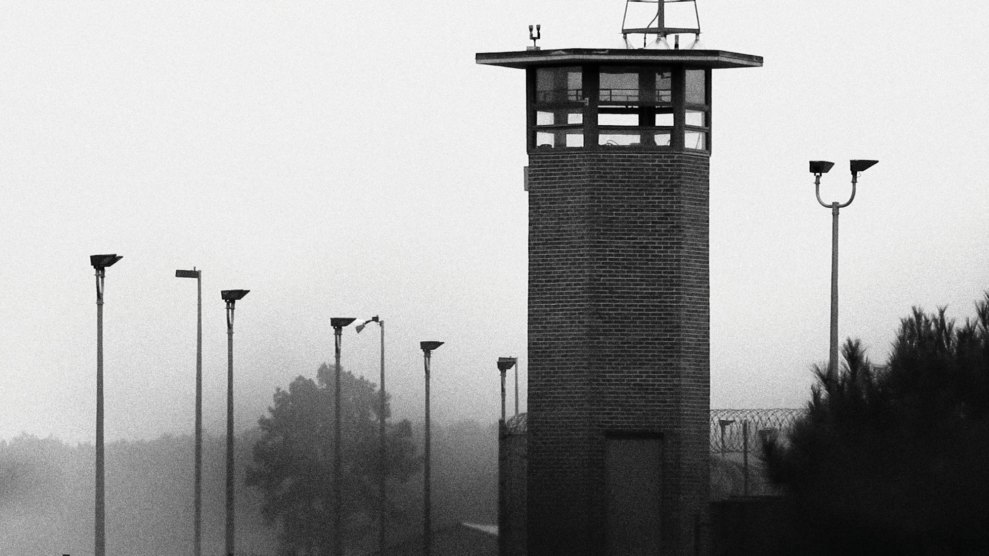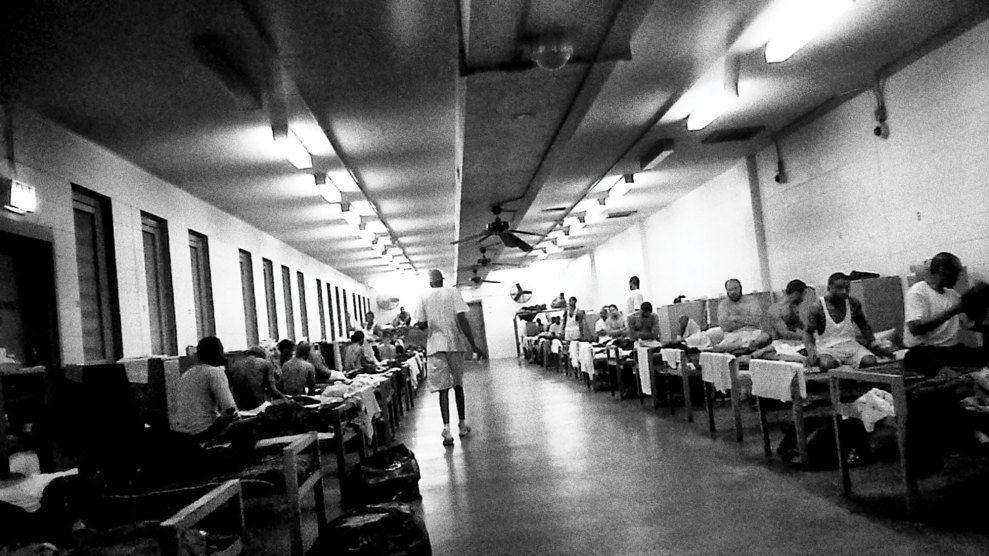
Read Mother Jones reporter Shane Bauer’s firsthand account of his four months spent working as a guard at a corporate-run prison in Louisiana.
It began with a complaint about salad.
Since he started serving time in the ’70s, Melvin Leroy Tyler has filed dozens of lawsuits advocating better conditions in Missouri prisons, earning himself the nickname King of the Writs. One newspaper dubbed him one of the “finest jailhouse lawyers this state has ever produced.” In 1994, Tyler filed a case a case about dangerous conditions at Farmington Correctional Center, including allegations of overcrowding and food contamination. But his complaints would become infamous for a passing mention that the prison cafeteria’s salad bar was only available to guards.
Tyler’s salad bar protest was held up as exhibit A in the campaign to stem the supposed flood of frivolous prison lawsuits clogging up the nation’s courts. Jay Nixon, then Missouri’s attorney general (and now its governor), singled out Tyler and sneered that “these recreational litigators can be very creative when it comes to constitutional rights.” Other examples of outrageous cases cited by Nixon and 23 of his fellow AGs included an inmate’s $1 million suit “because his ice cream had melted,” and a demand for LA Gear or Reebok sneakers instead of prison-issued Converse.
Shutting down these lawsuits became a pillar of the tough-on-crime agenda then sweeping Capitol Hill. Under the Prison Litigation Reform Act (PLRA), passed with overwhelming bipartisan support in 1996, prisoners who seek to file federal civil rights cases must first jump through several hoops, like exhausting all internal grievance procedures and paying $350 to file a case.
Yet much of the evidence cited in support of the law was thin. As the bill was making its way through Congress, Jon O. Newman, a federal appeals judge, found that tales of ridiculous lawsuits “were at best highly misleading and, sometimes, simply false.” Tyler’s complaint had been ripped without context from a case that, Newman wrote, “concerned dangerously unhealthy prison conditions, not the lack of a salad bar.”
The law’s backers claimed it would protect inmates with legitimate complaints. Instead, it established a labyrinth of red tape. Between 1995 and 2012, as prison populations swelled 40 percent, the number of federal civil rights cases filed by prisoners dropped by more than 70 percent. About one-tenth of those cases resulted in an outcome favoring inmates, a slight decrease from the 1990s. If the PLRA was meant to filter out flimsy lawsuits, we should see more prisoners winning their cases, notes University of Michigan law professor Margo Schlanger. But now, she says, “each success is harder fought.”
Human Rights Watch has found that the law is often invoked to throw out cases on technicalities, even suits involving sexual assault, juveniles, or prisoners who are illiterate, deaf, or mentally ill. “This is a classic case of the fox guarding the henhouse,” says David Fathi, the director of the American Civil Liberties Union’s National Prison Project. “What we have done is dismantle the only oversight system that we had for prisons, which was litigation,” adds Schlanger.
Most inmates have little recourse but to represent themselves. The law further discourages lawyers from taking their suits by capping damages and recoverable costs. “There were never a whole lot of lawyers doing this in the first place,” says David Rudovsky, a civil rights attorney in Philadelphia. Suing prisons, he says, “is even more difficult than suing police officers.”
Now 73, Melvin Tyler lives in Missouri’s Jefferson City Correctional Center, a maximum-security prison located on No More Victims Road, where he is serving a 185-year sentence for rape, assault, and robbery. (He says he was wrongfully convicted; in 2009, the Innocence Project took up his case.) “I picked up a lot of enemies” due to the salad bar case, he tells me. “But if I hadn’t intervened, there would have been hundreds of people that would have died.”
The Prison Litigation Reform Act, Tyler explains, “destroys the ability of prisoners to seek and pursue legitimate claims.” The most unforgiving part of the law, he says, is its filing fee requirement. Sometimes the only way to fund a new lawsuit is to round up a bunch of guys to pool their money. Even though the Supreme Court unanimously shot down a prisoner’s challenge to part of the PRLA earlier this year, Tyler is working on a class-action suit questioning the constitutionality of the filing fee—one of more than 45 cases currently on his plate.













